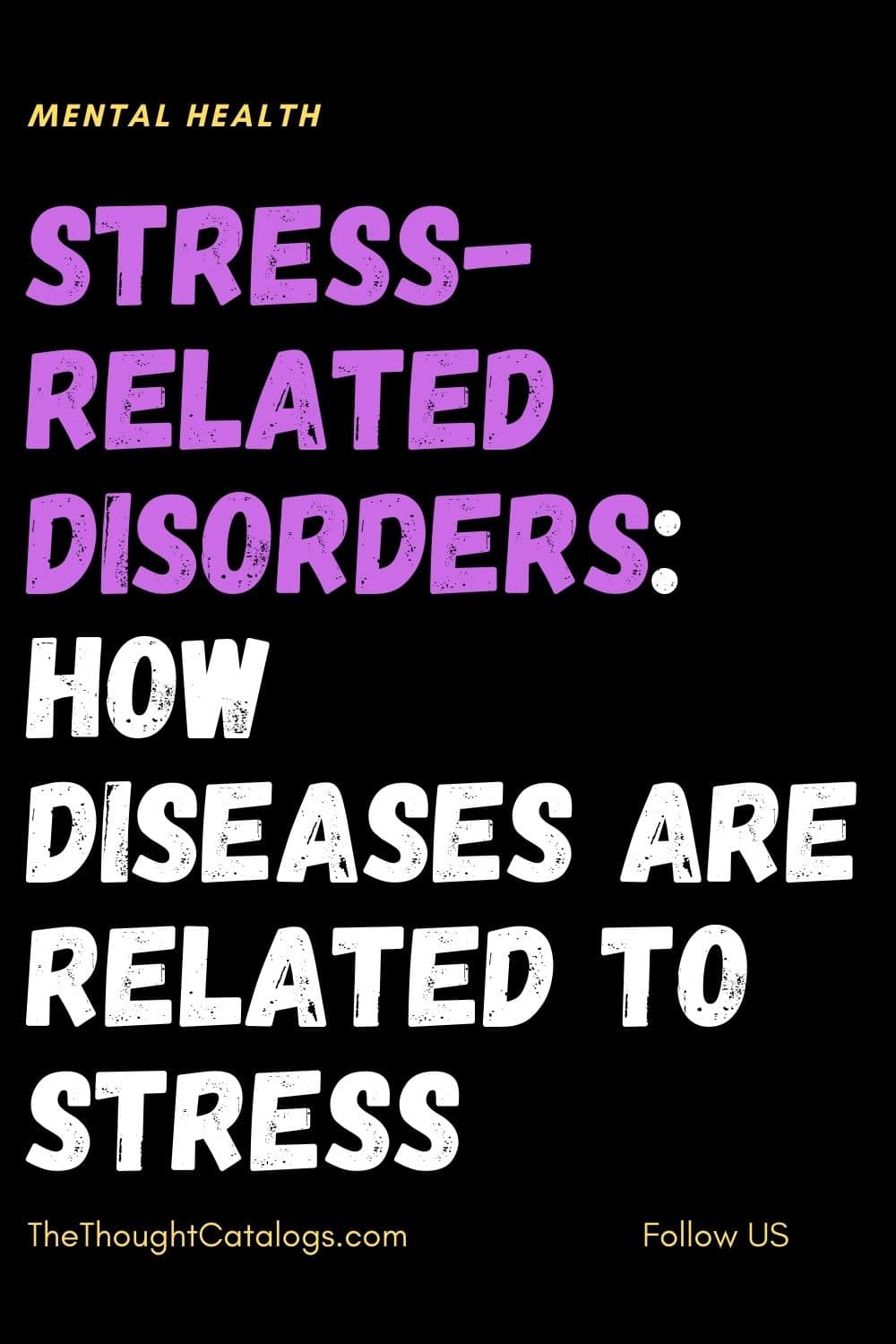
Stress is an inevitable part of life. It is the body’s response to external pressures or demands, which can be both physical and psychological. While some stress is considered normal and can even be beneficial in certain situations, prolonged or chronic stress can have a detrimental impact on our overall health. Stress-related disorders encompass a wide range of conditions that are directly or indirectly influenced by stress. In this article, we will explore how stress is connected to various diseases and disorders, both physical and mental, and discuss the importance of managing stress for better health.
Understanding Stress-Related Disorders
Before delving into the specific diseases and disorders related to stress, it is essential to understand what stress-related disorders entail. Stress-related disorders encompass a group of conditions that are triggered or worsened by excessive or chronic stress. These disorders can manifest in both physical and mental health problems, leading to a decline in overall well-being.
Common types of stress-related disorders:
- Generalized Anxiety Disorder (GAD): This is characterized by excessive worry and anxiety about everyday situations, often disproportionate to the actual threat.
- Panic Disorder: Individuals with panic disorder experience sudden and recurrent panic attacks, which are intense episodes of fear accompanied by physical symptoms.
- Depression: Although depression has various causes, chronic stress can contribute to the development and exacerbation of depressive symptoms.
- Post-Traumatic Stress Disorder (PTSD): This disorder occurs in individuals who have experienced or witnessed a traumatic event, leading to persistent stress symptoms, such as nightmares and flashbacks.
- Chronic Fatigue Syndrome: This condition is characterized by extreme fatigue that cannot be explained by an underlying medical condition and may be triggered or worsened by chronic stress.
The Impact of Stress on Physical Health
Stress doesn’t just affect our mental well-being; it also takes a toll on our physical health. Numerous studies have highlighted the connection between chronic stress and the development of various chronic diseases. Let’s explore some of the ways stress affects our physical well-being:
The connection between stress and chronic diseases
Chronic stress can contribute to the development of several long-term health conditions, including:
Cardiovascular diseases: Prolonged stress has been linked to an increased risk of heart disease, high blood pressure, and stroke. Stress triggers the release of stress hormones, such as cortisol, which can lead to elevated blood pressure and increased strain on the heart.
Immune system dysfunction: Stress weakens the immune system, making individuals more susceptible to infections and illnesses. Chronic stress can also prolong the duration of illnesses and delay the healing process.
Gastrointestinal disorders: The gut is highly sensitive to stress, and chronic stress can exacerbate gastrointestinal conditions such as irritable bowel syndrome (IBS), ulcers, and inflammatory bowel disease (IBD).
Stress-related disorders in the cardiovascular system
The cardiovascular system is particularly vulnerable to the negative effects of stress. Prolonged stress can lead to the constriction of blood vessels, increased heart rate, and elevated blood pressure, all of which contribute to cardiovascular problems. In the long run, chronic stress can increase the risk of heart attacks, heart disease, and stroke.
Effects of Stress on the immune system
Stress has a profound impact on the immune system, impairing its ability to function optimally. When the body is under stress, the production of stress hormones suppresses the immune response, making it harder for the body to fight off infections and diseases. Consequently, individuals experiencing chronic stress may experience more frequent illnesses and prolonged recovery times.
The link between stress and gastrointestinal disorders
The gut and the brain are closely connected through the gut-brain axis. Stress can disrupt the delicate balance in the gut, leading to gastrointestinal disorders. Conditions such as irritable bowel syndrome (IBS), ulcers, and inflammatory bowel disease (IBD) can be triggered or worsened by chronic stress. Additionally, stress can exacerbate symptoms in individuals already suffering from these conditions.
Mental Health Disorders and Stress
Stress and mental health disorders often go hand in hand. Prolonged or excessive stress can contribute to the development of various mental health conditions. Here are a few examples:
Stress as a contributing factor to anxiety disorders
Anxiety disorders, such as generalized anxiety disorder (GAD) and panic disorder, are closely associated with stress. Chronic stress can heighten feelings of worry, fear, and unease, leading to excessive anxiety. It is important to address the underlying stress when managing anxiety disorders effectively.
Relationship between stress and Depression
Depression can have multiple causes, including genetic predisposition and life circumstances. However, chronic stress can be a significant contributing factor. Prolonged stress disrupts the balance of neurotransmitters in the brain, such as serotonin, which can lead to depressive symptoms.
Post-Traumatic Stress Disorder (PTSD)
PTSD is a stress-related disorder that occurs in individuals who have experienced or witnessed a traumatic event. Stressful events can overwhelm the normal coping mechanisms of the brain, leading to persistent stress symptoms, such as nightmares, flashbacks, and severe anxiety. PTSD requires professional treatment and support to manage the symptoms effectively.
The Role of Stress in Autoimmune Disorders
Autoimmune disorders occur when the immune system mistakenly attacks healthy cells and tissues in the body. While the exact causes of autoimmune disorders are not fully understood, stress has been identified as a significant trigger and exacerbating factor for these conditions.
Overview of autoimmune disorders
Autoimmune disorders encompass a wide range of conditions, including rheumatoid arthritis, lupus, multiple sclerosis, and psoriasis. In these disorders, the immune system mistakenly identifies the body’s cells as foreign and attacks them, leading to inflammation and damage.
How stress affects the immune system and triggers autoimmune responses
Stress disrupts the delicate balance of the immune system, leading to dysregulation and dysfunction. Stress hormones, such as cortisol, can suppress certain immune functions while activating others, creating an imbalance that can contribute to the development of autoimmune responses.
Examples of stress-related autoimmune disorders
Some autoimmune disorders have been closely linked to chronic stress. For example, research has shown that stress can trigger flare-ups in individuals with psoriasis, an autoimmune skin condition. Similarly, stress has been implicated in the worsening of symptoms in conditions like rheumatoid arthritis and lupus.
Managing Stress for Better Health
Given the significant impact of stress on both physical and mental well-being, it is crucial to prioritize stress management. Here are some techniques for effectively managing stress:
Techniques for stress management
- Regular exercise: Engaging in physical activity releases endorphins, which are natural mood-boosting hormones. Exercise also helps reduce stress levels and promotes overall well-being.
- Relaxation techniques: Techniques such as deep breathing, meditation, and yoga can help calm the mind and relax the body, reducing stress and anxiety.
- Healthy lifestyle choices: Eating a balanced diet, getting enough sleep, and avoiding excessive alcohol or substance use contribute to overall stress reduction and improved well-being.
- Time management: Prioritizing tasks, setting boundaries, and delegating responsibilities can help reduce feelings of overwhelm and stress.
- Social support: Building a strong support network of friends, family, or support groups provides a sense of connection and helps alleviate stress through shared experiences and emotional support.
The importance of self-care
Self-care plays a vital role in managing stress and maintaining overall well-being. Taking time for oneself, engaging in activities that bring joy and relaxation, and practicing self-compassion is essential for managing stress effectively.
Seeking professional help for stress-related disorders
If chronic stress or stress-related disorders are significantly impacting daily life and well-being, it is important to seek professional help. Mental health professionals, such as therapists or counselors, can provide guidance, support, and evidence-based treatments to manage stress and associated disorders.
Conclusion
Stress-related disorders encompass a broad spectrum of conditions that can significantly impact physical and mental health. Chronic stress has been linked to various diseases, including cardiovascular problems, autoimmune disorders, and mental health conditions such as anxiety and depression. Understanding the connection between stress and diseases is crucial for adopting effective stress management strategies and prioritizing self-care. By managing stress levels and seeking appropriate support when needed, individuals can mitigate the impact of stress on their overall health and well-being.
FAQs
- Can stress cause physical illness?
- Yes, chronic stress can contribute to the development of physical illnesses, including cardiovascular diseases, gastrointestinal disorders, and immune system dysfunction.
- How can I manage stress in my daily life?
- Some effective stress management techniques include regular exercise, relaxation techniques like deep breathing or meditation, maintaining a healthy lifestyle, managing time effectively, and seeking social support.
- What are some signs of stress-related disorders?
- Signs of stress-related disorders can include excessive worry or anxiety, panic attacks, persistent feelings of sadness or hopelessness, fatigue, and physical symptoms like headaches or stomachaches.
- Are stress-related disorders treatable?
- Yes, stress-related disorders are treatable. Treatment options may include therapy, medication, lifestyle changes, and stress management techniques tailored to individual needs.
- Can stress impact my immune system?
- Yes, chronic stress can weaken the immune system, making individuals more susceptible to infections, prolonging illness duration, and potentially triggering or exacerbating autoimmune responses.





